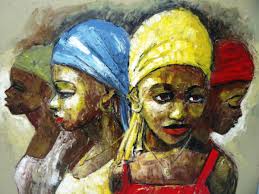By Tochi Eze
Christmas in Nando arrives like an overseas guest, like it just dropped out of a plane and landed at your doorstep. One moment, we were scurrying about at dawn, rushing to fetch water before school, and the next, Uguru appeared from nowhere – cold wind and dry dust. Now, we can barely make one trip to the stream without feeling like we are carrying some severe punishment on our shoulders. The breeze is crisp and dirty and my mouth, baked from the dryness, looks like rumpled cloth, the kind you washed and spread and wore in a hurry. Here, the harmattan has always been terrible, worse than the type they have in Aba and Onitsha, worse than even in Enugu.
Nkoli, our last born, has been sniffing all week because of the dust, her breathing is forced and dry, and at night, she sounds like a tired, overused generator, those cheap ones they make in China. But it is not the sound, or the cold, or the stench of Bobo’s dried urine on our coverless foam that makes it impossible to sleep. It is knowing that Christmas is almost here; that if it were traveling from Lagos, it is now in Akwa, a few minutes away.
Our village has begun to take shape, like a little girl growing and filling out her oversized dress. The township people who usually arrived in trickles have suddenly all started rushing in, Ndi Aba today, Ndi Achalla last week, everyone trooping into town as if somebody is about to close the gate. The only other time our village gets full is when the Umu Ada gather for their August meeting. Around that time, the women will be all over Afor market, pricing Okporoko and comparing it with rates at Onitsha and Port Harcourt. Also, they come in shiny new lace blouses, always white, and always different from the year before. Pa Nnukwu says it is the only way for each woman to show that her life in the city is more fanciful than those of others, the way they measured their progress. They usually look the same to me anyway, as if someone stuffed them into the blouse, as if a person pushed and pushed and sat on them until they fit into the attire, looking bloated and sweaty, the roundness of their arms hanging heavy at each side.
The only ones who look different are the younger brides, but even they do not impress me that much, especially the married ones from Lagos, Efulefus who cannot speak Igbo without sounding like they are talking from the television. They speak the language anyhow, without our local dialect, allowing the words to sound out flat and uneventful.
Still, Christmas is always different, always better. For one, the celebration stretches over the entire month. It makes itself present, first through the harmattan, then through Father Biko’s sermons at morning mass which become unusually congratulatory, as though witnessing December was the same as acquiring a land at Achalla Layout.
This particular December came as a huge relief for many people, as if there was some unspeakable dread that hung over the village all through the year, raining down drops of misfortune. True. Was it not in January, barely two weeks into the New Year, when the roof at the community school suddenly gave way and came tumbling down, as if it had been carrying the weight of the country on its rusty sheets? Then there was March, when Adaugo, the Baptist preacher’s first daughter got pregnant and wouldn’t say who put the baby in her stomach. The other day, Nma Cetus was telling mother about Obiageli, Isi Nkpi’s child that had suddenly gone missing, only sixteen and fresh out of secondary school. The people of Addo, the next village, had searched and searched for her, and after three weeks of not hearing anything conducted a summarized burial, the quiet ones organised for young people who die. These are the kind of things Father Biko has been using to punctuate his sermons. Onye nke ahu efugo – That one has gone missing, he would bellow into the microphone, his eyes trailing some imaginary object in the audience, like he was lost in a trance. He would then remind the villagers of the tragedies that befell us through the year and warn for extra vigilance and prayers. Tinye nu chaplet na mmiri – Say your prayers, he would admonish.
On December 19, in the heat of afternoon, Nma Cetus burst into our yard with more news, this time about Ojakiri, the village drunk, the local jester who would stroll through Afor market in the hot afternoon, wearing nothing but his cream trousers that hung too low, revealing the crack of his butt. She relayed, with her typically hurried sentences, how the meat sellers, returning from the abattoir in Addo, had found Ojakiri lying in a gutter, very dead, his skin baked in the sun, spittle fresh in his mouth, and houseflies swimming around his groin, evidence of the shit he had shat on himself. I listened from the room I shared with Nkoli and Adaugo and Bobo, on the worn-out mattress we spread on the floor, the one that Bobo destroyed with his constant bedwetting at sixteen. But while I was horrified by the death that had suddenly befallen Ojakiri, I was fascinated by Nma Cetus’ narration. It was mostly the way the words came out of her mouth like thunder, surprising and delightful at the same time… To be continued!


